Ripples of soft banter can be heard from a group of women handwashing clothes by a stream. Others chat busily as they make liquid soap to sell at the market. In the afternoon, the roar of excited voices is heard as children play their ritual afternoon game of soccer on a pebbled playground or roll a tire down a dirt alley. The sense of community and happiness—amid poverty-stricken living conditions with no running water, shacks with mud walls, and scarce food—is what stood out to the several Regis faculty and staff and 12 alumni who went on a service trip to the Manyatta slum in Kisumu, Kenya, during winter break 2018–2019.
“The boys played soccer really well and looked natural, even when they wore no shoes, slippers, one shoe, or both shoes,” recalls Regis Assistant Professor of Biology Danqing Xiao, PhD, who joined in the game with other Regis service team members. “They ran like they were flying—swift and agile. They fought hard and beautifully. Their young spirits, against the odds of poverty, moved me; in fact, many of them dream to be professional soccer players.”
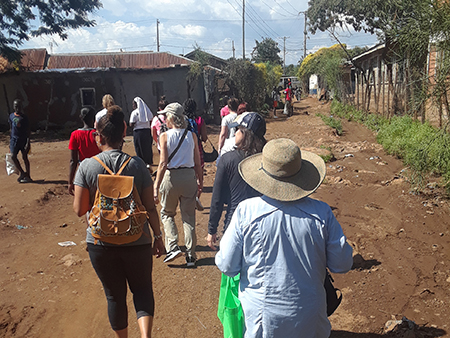
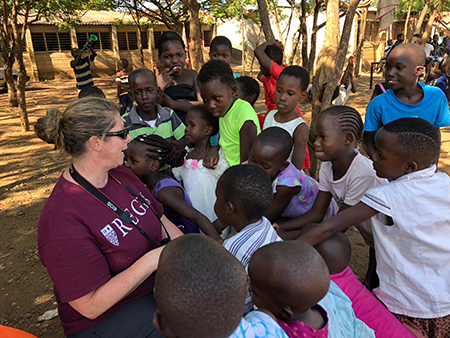 Left: The Regis team heads back to Manyatta Primary School following a lunch at the home of “slum father” Davis Ouma.
Left: The Regis team heads back to Manyatta Primary School following a lunch at the home of “slum father” Davis Ouma.
Right: Regis Associate Vice President for Information Technology and Chief Information Officer Kate Korzendorfer gathers with local children.
The chance to be on the soccer team is something that the children value, an educational initiative started by Davis Ouma, who grew up in the slum and is known as “the slum father” for his work with youth in Kisumu City. The Regis cohort did community initiatives in partnership with Ouma’s program, which uses soccer (and a free meal) as a platform to motivate students to attend school.
It was Jeffrie Parrish ’14 who first connected Regis with Ouma after the pair met in 2014. At the time, Parrish was working with schools in western Kenya running soccer and tennis clinics.
We think we’re going in to give to these poor areas, but then we go and we realize that we get much more than we gave.
Regis Chaplain Father Paul Kilroy
“We followed Davis’ leadership and provided life-skills classes, school fees, and playing opportunities for the neediest students in the Manyatta slums,” says Parrish, who was captain of the Regis men’s soccer team at the time and is now a math teacher at Framingham High School in Massachusetts.
So when Regis Chaplain Father Paul Kilroy was planting the seeds for a student service trip to Kenya in 2017, it was Parrish (then a graduate intern in the Center for Ministry and Service) who was instrumental.
“I’ve always been interested in what students are learning outside the classroom, about life and about themselves,” Kilroy says. “Service trips are a game changer for many students as they experience the wider world and reflect on it.”
After the success of the student trip, Kilroy planned one for alumni, faculty, and staff during winter break 2018–2019 that included a women’s leadership summit, hygiene education and distribution of hygiene supplies (toothbrush, toothpaste, sanitary pads), a cleanup day, and sponsorship of a soccer tournament (including new uniforms for the winning team).
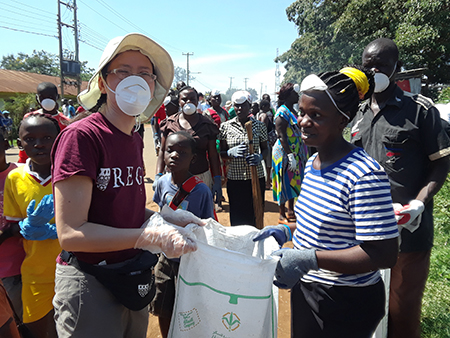
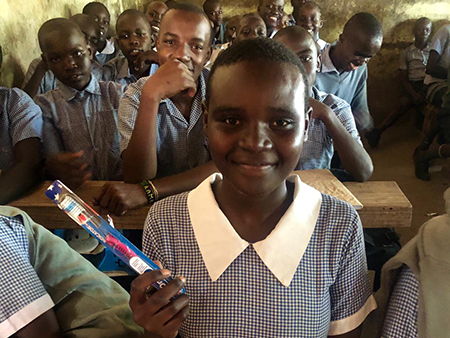 Left: Working with locals during cleanup day.
Left: Working with locals during cleanup day.
Right: Students during the Regis dental hygiene classroom presentation.
Former home economics teacher Andrea Owens Shagory ’66 was among those who taught dental hygiene to a class of more than 90 students. “Since the school has no textbooks, I brought a book with color photos of the progression of development from baby teeth to wisdom teeth and a large poster of the inside of a tooth. We also taught two students—one girl and one boy—proper brushing technique and then they taught others how to do it.”
Those small moments of empowerment are what Shagory found inspirational, though she was also struck that in the slum, education is secondary for women. “Progress is being made, but the more women you can educate, the sooner it will happen.”
Ouma says that over the years Parrish (who was unable to attend this most recent trip due to work commitments) and Regis cohorts have helped his program grow. “I appreciate Jeff and Regis College; without them we couldn’t have come this far in strengthening the community project through cultural discussions, education, cleanup initiatives, and provisions.”
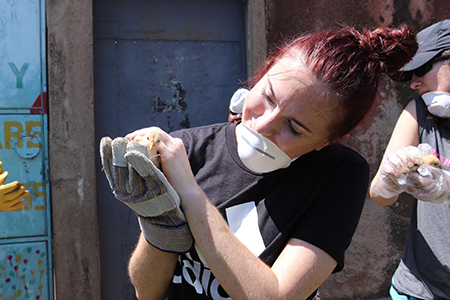
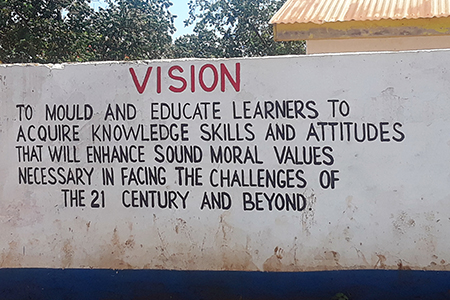 Left: Erica Maloney ’13 holds a chick during cleanup day.
Left: Erica Maloney ’13 holds a chick during cleanup day.
Right: A sign that sits outside a local school.
During the leadership summit, the Regis team and women from the slums shared stories of their day-to-day lives—each group talking about their culture, family, and work. Xiao recalls sitting alongside a mother who was hand-making bricks out of dried grass and mud to be used to make fires for cooking; another woman was making liquid soap by combining different ingredients to give it a “beautiful green color.” In the afternoon, they accompanied the women to the market where they sold the goods.
“We were immersed in the women’s lives for a day,” says Mark Harrington, EdD ’16, an assistant professor and program director at Canisius College and former assistant dean of student affairs at Regis. “One of the most important experiences from a service immersion trip is having that kind of connection with the people you are serving.”
Amanda Venezia ’11, who works as a paralegal in Boston, agrees. “A huge takeaway is that these women and men are so much more resourceful than we are. They live in a world where nothing is given to them, where supplies are limited, where water is scarce, and where clothes don’t come cheap. But they make it work with the resources they have. The women spend all day figuring out how to put food on their family’s table and they do just that, even when children eat before they do.”
On a broader level, Venezia was moved to find sustainable ways for struggling communities to thrive. “We need to listen to them about how we can help in their country and not how we can help them in ours. Once the supplies we bring are used, they are gone. We need to figure out how to supply the children with toothbrushes and toothpaste, for example, using their resources and I think that was a big lesson learned for me.”
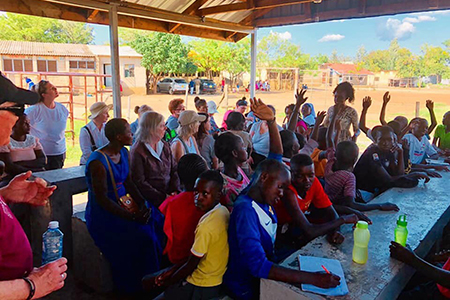
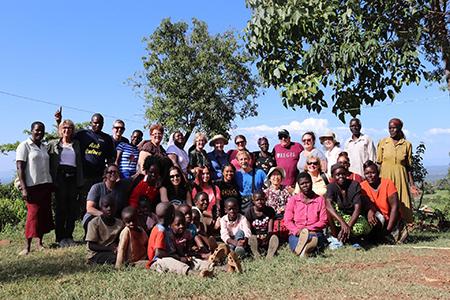 Left: The Regis team teaches a life-skills class.
Left: The Regis team teaches a life-skills class.
Right: The Regis team gathers with friends and family of “slum father” Davis Ouma during a lunch trip to the mountains.
Harrington was inspired by the entire community, but he was particularly struck by the work of young people like Ouma—who is only 25—and Collins Omuga, who grew up in the Manyatta slum, is attending Catholic University of Eastern Africa, and is planning to return to the slum to be a teacher.
“Davis and Collins are inspiring because they are helping to ensure that the next generation will have a better community and a better tomorrow,” Harrington says.
And it’s working. On a cleanup day in the slum, Shagory recalls the beauty of seeing over 200 children join in. “They couldn’t do enough. They were running from one spot to the next, one student would be holding the bag and two would be filling it with trash. They were so enthusiastic; their spirit of cooperation was amazing.”
Harrington is still moved to this day. “It was incredible to connect with the people of Kisumu on the other side of the world—committed to running community service and education programs with very little funding. Since returning home, their inspiration has motivated me to strive for greatness to support student success.”
“For every mission trip I’ve been on, I come back amazed at how peaceful and happy people are when they have so few material possessions compared to what we have,” Kilroy adds. “We think we’re going in to give to these poor areas, but then we go and we realize that we get much more than we gave.”
Read more articles
Read the entire magazine online